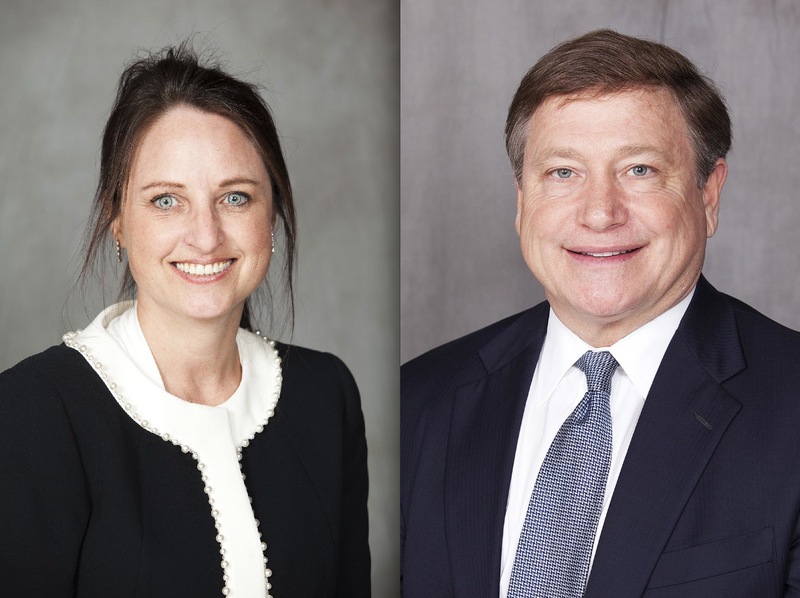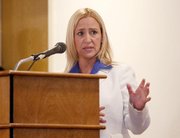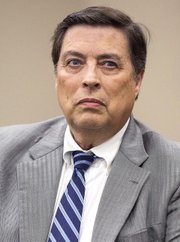Corrections: The first name of former Arkansas Attorney General Dustin McDaniel was incorrect in this article about the Arkansas Supreme Court and the state’s gay marriage ban. The article also omitted stating that Cheryl Maples is attorney for the plaintiffs in the case.
The Arkansas Supreme Court ended any dispute over who will decide the fate of the ongoing challenge to the state's same-sex marriage ban.
Document set
Gay marriage in Arkansas
- Marriage-license lawsuit order
- Opinion/concurrence on justices in gay-marriage case
- Maples motion to dismiss new case
- Leslie Rutledge brief on behalf of state
- Wagoner amended motion
- Chief Justice Jim Hannah recusal letter
- Justice Rhonda Wood recusal letter
- Justice Paul Danielson recusal
- Plaintiffs' response to request for second oral arguments
- Plaintiffs' motion for lifting of stay
- Legislative roll call — Motion to suspend rules
- Interim resolution in support of Amendment 83
- Arkansas Supreme Court stays judge's gay-marriage ruling pending appeal
- Plaintiffs respond to state's request for stay
- McDaniel again asks Supreme Court for stay of gay-marriage ruling
- Judge Piazza May 15 final order on gay marriage bans
- Order denying defendants' motion for immediate stay
- Gay-marriage case plaintiffs' motion for clarification of judgment
- Piazza final order on gay marriage nunc pro tunc
- Piazza notice to attorneys of clarified order
- Court declines stay of gay-marriage ruling
- Piazza strikes down Arkansas' same-sex marriage ban
In an opinion penned by Justice Karen Baker, the state's highest court ruled that the current members of the court will decide CV-14-427, the case regarding the effort to invalidate the state's constitutional ban on gay marriage.
The ruling clears the way for two new justices, Robin Wynne and Rhonda Wood, to rule on the issue that was argued in last year's Supreme Court.
At dispute in a subsequent case, CV-15-227, which was a spinoff of the 2014 gay-marriage challenge and which Baker's opinion addressed, was whether Wood or a special justice appointed in September by former Gov. Mike Beebe, Robert McCorkindale, should weigh in on the decision.
In April, both Chief Justice Jim Hannah and Justice Paul Danielson recused themselves from the spinoff case, arguing that the rest of the court was deliberately delaying a ruling in CV-14-427.
In his recusal letter , Danielson said that "this court has manufactured a case where no case or controversy exists."
According to Baker's Thursday opinion, both Wood and McCorkindale thought they should rule in the original gay-marriage case, CV-14-427
Attorneys on both sides of the gay-marriage challenge differed, at least initially, on who was entitled to hear the case.
"The question before us is neither trifling nor insignificant," Baker wrote. "Instead, it is a question of major constitutional significance."
Although the court ruled on who will rule on the gay-marriage case, the opinion did not state how the court will proceed.
The court could immediately confer on the case, which was fully briefed and argued by late November, according to an attorney representing gay couples challenging the law.
The arguments were recorded, so new members could simply review what was already said.
Or, Cheryl Maples said, the court could fulfill the request made by state attorneys and order another round of oral arguments for the benefit of Wynne and Wood.
On Thursday, Arkansas Attorney General Leslie Rutledge welcomed the latest ruling.
"I am pleased that the Arkansas Supreme Court has resolved this issue and has agreed with the state that only the justices currently sitting on the court can decide the same-sex marriage case," Rutledge said. "My office stands ready to defend [the gay-marriage ban] in a second oral argument should the justices decide that it would be beneficial."
Maples, who -- to expedite a ruling -- withdrew her argument that McCorkindale should hear the case, said she wants the court to make a decision without further delays.
"Oral arguments are basically a summary of what's in the [legal] briefs, and they're very much available on the court's own video. There is no reason for anymore delay," Maples said. "Requiring oral arguments again would just absolutely be for delay purposes. There is no reason for it."
More than five months after the last oral arguments, it's unclear when a ruling will come.
In the spring of last year, Pulaski County Circuit Judge Chris Piazza ruled that the state's bans on same-sex marriage are unconstitutional. The case was appealed to the state Supreme Court last year.
Cliff Hoofman, who was a justice on the court at the time, recused from hearing the case and, in September, retired. Boone County Circuit Judge McCorkindale was named as a special judge to hear the case in Hoofman's stead. Although the high court heard the arguments in the case last year, it did not issue a ruling.
On Jan. 1, Hoofman's term on the court ended, and Wood succeeded him. Also, Wynne joined the high court, replacing Donald Corbin, who retired.
In addition, Democratic Attorney General Justin McDaniel's term in office ended, and Republican Rutledge succeeded him.
On Jan. 23, Rutledge asked the high court to allow a second round of oral arguments in the gay-marriage case so the new justices could weigh in. Attorneys representing gay couples objected, raising the question of which court -- last year's or this year's -- should decide the gay-marriage case.
On April 2, the high court created a severed case -- CV-15-227 -- to determine which of the two courts should issue the ruling on the gay-marriage case, CV-14-427.
Chief Justice Hannah and Justice Danielson recused from the severed case on April 8, saying that the new case was a way of delaying making a decision in the gay-marriage issue. Wood had recused from the severed case the week before.
On April 14, Gov. Asa Hutchinson appointed 14th Judicial Circuit Judge Shawn Womack, Searcy attorney Brett Watson and former Supreme Court Chief Justice Betty Dickey as special judges to hear CV-15-227.
In his recusal letter, Hannah wrote that McCorkindale should finish the case out of respect for the powers guaranteed to Beebe by the state constitution.
Hannah wrote that efforts to remove McCorkindale were an attempt by "judicial fiat" to "usurp the power" of the executive branch.
Baker's opinion Thursday contended that the state constitution's Amendment 80, which gave justices eight-year terms to handle cases, trumped an old appointment by a governor.
University of Arkansas at Little Rock law school professor Ken Gallant said that the ruling was interesting in that, in the entirety of the court's history, there had never been a similar Supreme Court conflict.
"I'm surprised that they haven't figured out a tradition or what do about this before," Gallant said. "I don't see anything wrong with the solution that they came up with. If the case isn't decided by the time a new judge comes on, that new judge is part of the court."
Whatever happens next is set against a ticking clock in the United State Supreme Court.
Last month, the nation's high court heard arguments to settle the gay-marriage question on federal constitutional grounds, and a ruling is expected by late June.
A ruling at the federal level would supersede any ruling by Arkansas' top court, legal experts agreed, but it wouldn't address questions raised in legal arguments that directly speak to the Arkansas Constitution.
Maples said she would be surprised if the new court didn't require another round of oral arguments, further delaying the case she thinks should be decided locally.
"Issues will come up again, and [the court] might as well address it and make sure that those inalienable rights contained in the Arkansas Constitution cannot be overturned by the vote of the people," she said. "They're supposed to be inalienable. ... Those rights include the right to carry a gun, the right to religion and the right to equal protections [for straight and gay citizens]."
Former Arkansas Supreme Court Justice Bob Brown said that oral arguments could cause delay and said he would like to see the state court rule before Washington does.
At one level, Brown said, it's important to have the Arkansas court address the constitutional issues raised by Maples. In another respect, he said, it would be a good sign that court could act in unison.
The case has revealed dysfunction and dissent at a level, that is rarely seen by the public, Brown said.
"I think the main thing is that I think for them to come together and have a ruling on the case and not simply wait for the U.S. Supreme Court to make the decision, I think that would dispel some anxiety about the situation that's been going on for a while," Brown said.
Metro on 05/08/2015



